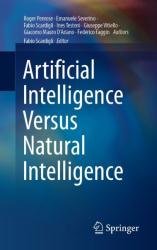Artificial Intelligence Versus Natural Intelligence
- Добавил: literator
- Дата: 18-10-2022, 13:28
- Комментариев: 0
 Название: Artificial Intelligence Versus Natural Intelligence
Название: Artificial Intelligence Versus Natural IntelligenceАвтор: Roger Penrose, Emanuele Severino, Fabio Scardigli
Издательство: Springer
Год: 2022
Страниц: 196
Язык: английский
Формат: pdf (true), epub (true)
Размер: 18.9 MB
This book centers around a dialogue between Roger Penrose and Emanuele Severino about one of most intriguing topics of our times, the comparison of artificial intelligence and natural intelligence, as well as its extension to the notions of human and machine consciousness.
Regarding those topics usually grouped under the heading “AI” (Artificial Intelligence), the perspectives of the two main speakers, the mathematical physicist Roger Penrose and the philosopher Emanuele Severino, are obviously quite different. Nevertheless, as the reader will soon discover, both agree that we do not yet have “intelligent devices”, and also that, if we follow the vision of the so-called Strong AI (presently still the mainstream), we will never be able to build such devices. This opinion is also supported by the authors of the other essays in the book, although with their own slant.
In his main talk, Penrose focuses on the relations between the words “intelligence”, “understanding”, and “consciousness”. “Being a mathematician”, he kids, “connections among words are more important to me than their “true” meaning”. Relations among concepts are more illuminating than substantial definitions, in other words. Therefore Penrose starts from the idea that the word “intelligence”, at least in the standard usage, implies “understanding”, and “understanding” requires some “awareness” or “consciousness”. Going through different examples, discussed in great detail, Penrose shows that the machines, or software, at our disposal today are computational devices, maybe very sophisticated, but all essentially based on the ideal prototype of the Turing Machine. “Intelligence” and “understanding”, on the other hand, seem to exhibit properties that escape simple computability. Intelligence is something more than mere computational ability. Examples taken from chess, mathematical induction (the intriguing Goodstein theorem), the tiling of the Euclidean plane (polyominoes, which cannot be produced through computable algorithms), all converge to show that “understanding is something which is not achieved by rules”. So, a general quality of understanding seems to be that it is not an algorithm. Hence, “understanding”, according to Penrose, is not an element or a result of a (very) complicated application of a set of rules (algorithm).
Penrose then reviews the two main theoretical pillars of modern physics, namely General Relativity and Quantum Mechanics, and points out that there is only one specific element of modern physics that cannot be reproduced on a computer, because it is not computable. To be precise, it is the measurement process in Quantum Mechanics, the so called “collapse of the wave function”. This is not described by the Schroedinger equation, and cannot be implemented (not even in principle) by any computable algorithm.
Additional insightful essays by Mauro D'Ariano, Federico Faggin, Ines Testoni, Giuseppe Vitiello and an introduction of Fabio Scardigli complete the book and illuminate different aspects of the debate.
Although from completely different points of view, all the authors seem to converge on the idea that it is almost impossible to have real "intelligence" without a form of "consciousness". In fact, consciousness, often conceived as an enigmatic "mirror" of reality (but is it really a mirror?), is a phenomenon under intense investigation by science and technology, particularly in recent decades. Where does this phenomenon originate from (in humans, and perhaps also in animals)? Is it reproducible on some "device"? Do we have a theory of consciousness today? Will we arrive to build thinking or conscious machines, as Machine Learning, or cognitive computing, seem to promise?
These questions and other related issues are discussed in the pages of this work, which provides stimulating reading to both specialists and general readers.
Скачать Artificial Intelligence Versus Natural Intelligence
[related-news] [/related-news]
Внимание
Уважаемый посетитель, Вы зашли на сайт как незарегистрированный пользователь.
Мы рекомендуем Вам зарегистрироваться либо войти на сайт под своим именем.
Уважаемый посетитель, Вы зашли на сайт как незарегистрированный пользователь.
Мы рекомендуем Вам зарегистрироваться либо войти на сайт под своим именем.
